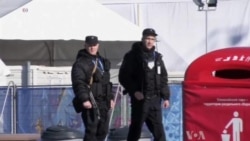It’s now less than one week until the Winter Olympic Games in Sochi. And while Russia tightens security, many experts agree that it could be too little, too late, saying that many threats are homegrown. No amount of security can keep out what experts say may already be inside.
Many recall, the bomb blast that rocked the stadium in Chechnya's captial city. It was May 2004, a parade on the 59th anniversary celebration commemorating the defeat of Nazi Germany in World War II. The bomb killed more than a dozen people, including the newly-elected Chechen president and other government officials. Dozens more suffer injuries from the explosion - the bomb was built into a concrete pillar.
This is why some experts fear that despite Russian President Vladimir Putin’s so-called “ring of steel” security in Sochi, it may already be too late.
“Assuming that it’s 100 percent effective, although nothing ever is, he set it up long after the Sochi Games were announced and construction started. That means that cells had the opportunity to move into place long before that construction,” explained Ian von Gordon, director of Operations at the Diplomatic Protection Training Institute in Youngstown, Ohio, which provides security to civilians in high threat environments. He's an expert on terror groups in the North Caucasus.
“There’s probably people who applied to work for either contractors, construction companies, or the Olympics itself, and then they were brought in by those companies as contractors or employees,” he said.
An estimated 100,000 contractors have been working in and around Sochi building venues for these Olympic Games. They expand sewers. They drive buses. And it is nearly impossible to vet all of them, said Glen Howard, president of the Jamestown Foundation, a research institute in Washington D.C.
“This is a big problem just by itself in the people that have already come to Sochi to work. They could have planted a bomb,” he said.
Like the parade in 2004. Experts said Chechen separatists may have planted those explosives in the stadium’s structure as many as three months earlier.
“I think I would be very surprised if there was not a bombing or something happened between now and the actual Olympics and when it starts on February 6,” Howard stated.
Sochi is just west of a neighboring Caucasus region where separatists have vowed to fight Russians to the death.
Andrew Kuchins, director of the Russia and Eurasia program at the Center for Strategic and International Studies in Washington, said the Games may be too good an opportunity for extremists to pass.
“Sochi is the Holy Grail, I would think, for a terrorist - Islamic jihadist - individual or group to go after. So, in a way, we have kind of the ultimate showdown,” he said.
“You have an unusual, unprecedented situation where you have people from all over the world - civilians - participating in a highly-publicized event,” said von Gordon.
While Russia continues its efforts to keep terrorism out of Sochi, the biggest threat to securing the Olympic Games may already be inside.
Many recall, the bomb blast that rocked the stadium in Chechnya's captial city. It was May 2004, a parade on the 59th anniversary celebration commemorating the defeat of Nazi Germany in World War II. The bomb killed more than a dozen people, including the newly-elected Chechen president and other government officials. Dozens more suffer injuries from the explosion - the bomb was built into a concrete pillar.
This is why some experts fear that despite Russian President Vladimir Putin’s so-called “ring of steel” security in Sochi, it may already be too late.
“Assuming that it’s 100 percent effective, although nothing ever is, he set it up long after the Sochi Games were announced and construction started. That means that cells had the opportunity to move into place long before that construction,” explained Ian von Gordon, director of Operations at the Diplomatic Protection Training Institute in Youngstown, Ohio, which provides security to civilians in high threat environments. He's an expert on terror groups in the North Caucasus.
“There’s probably people who applied to work for either contractors, construction companies, or the Olympics itself, and then they were brought in by those companies as contractors or employees,” he said.
An estimated 100,000 contractors have been working in and around Sochi building venues for these Olympic Games. They expand sewers. They drive buses. And it is nearly impossible to vet all of them, said Glen Howard, president of the Jamestown Foundation, a research institute in Washington D.C.
“This is a big problem just by itself in the people that have already come to Sochi to work. They could have planted a bomb,” he said.
Like the parade in 2004. Experts said Chechen separatists may have planted those explosives in the stadium’s structure as many as three months earlier.
“I think I would be very surprised if there was not a bombing or something happened between now and the actual Olympics and when it starts on February 6,” Howard stated.
Sochi is just west of a neighboring Caucasus region where separatists have vowed to fight Russians to the death.
Andrew Kuchins, director of the Russia and Eurasia program at the Center for Strategic and International Studies in Washington, said the Games may be too good an opportunity for extremists to pass.
“Sochi is the Holy Grail, I would think, for a terrorist - Islamic jihadist - individual or group to go after. So, in a way, we have kind of the ultimate showdown,” he said.
“You have an unusual, unprecedented situation where you have people from all over the world - civilians - participating in a highly-publicized event,” said von Gordon.
While Russia continues its efforts to keep terrorism out of Sochi, the biggest threat to securing the Olympic Games may already be inside.





